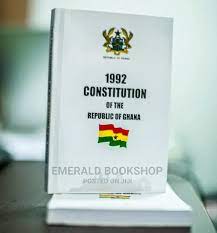Prof. Kwaku Asare Azar has stated that the 1992 Constitution has undergone nine amendments, all of which were implemented through the Constitution (Amendment) Act, 1996 [Act 527], which received assent on December 16th, 1996.
According to Prof. Azar, the 1992 Constitution specifies the Vice-President as the Chairperson of the councils responsible for the Police, Prisons, and Armed Forces, as outlined in the Constitution.
He stated that an intense dispute between President Rawlings and Vice-President Kow Nkensen Arkaah led to the introduction of three constitutional amendments.
He noted that among the amendments is the First Amendment, which pertains to the right to hold multiple citizenships, as outlined in Article 8.
“A citizen of Ghana may hold the citizenship of another country. Dual citizens cannot hold certain specific offices and others added by Parliament. A Ghanaian citizen who involuntarily loses his citizenship by virtue of a marriage to a foreign citizen will automatically regain his citizenship on dissolution of that marriage”.
Prof. Kwaku Asare Azar
Prof. Kwaku Azar further noted that the Second Amendment pertains to the right to renounce Ghanaian citizenship, as stipulated in Article 9.
He pointed out that, as a result, Parliament was vested with the authority to legislate on matters related to the acquisition, loss, and renunciation of Ghanaian citizenship.
According to Professor Azar, the Third Amendment deals with the timeframe for holding by-elections to replace members of parliament who have passed away, as outlined in Article 112.
He specified that in the event of a parliamentary seat becoming vacant due to death, a by-election must be held within a 60-day window from the date of the vacancy
Prof. Kwaku Azar explained that the Fourth Amendment deals with the provision of proportional gratuities to members of Parliament, as outlined in Article 114.
He pointed out that under this amendment, a Member of Parliament who has served for any duration is eligible to receive a pro-rata gratuity, as specified in Article 71, either upon their passing or when they cease to be a Member of Parliament.
He explained that this entitlement to a pro-rata gratuity, as stipulated in the constitution, is revoked if a Member of Parliament is disqualified or vacates their seat under the circumstances specified in Article 97(1) (c) or (d).
Expanded Media Membership And Anti-Political Bias Measures
Furthermore, Prof. Kwaku Asare Azar explained that the Fifth Amendment deals with the enlargement of the National Media Commission’s membership and the ineligibility of certain politicians to serve on the commission, as stipulated in Article 166.

“The National Media Membership Commission is expanded to 18 by the addition of a representative from the National Council on Women and Development, the Trade Union Congress, and the Association of Private Broadcasters. A founding member, leader, or executive of a political party is disqualified from being on the Commission”.
Prof. Kwaku Asare Azar
He also mentioned that the Sixth Amendment, which relates to the extension of retirement benefits (as outlined in Article 199), addresses the re-employment of retired public officials.
He explained that a retired public official can be rehired for a term not exceeding two years, if the demands of the service necessitate their return, and can be extended for additional two-year periods if needed.
He added that while the initial re-employment period may be up to two years, any subsequent extensions cannot exceed a total of five years, with the appointing authority determining the specific terms and conditions.
According to Prof. Azar, the Seventh Amendment (Article 201) governs the appointment of the Police Council Chairman, which is to be made by the President, acting on the advice of the Council of State.
Prof. Azar noted that the Eighth Amendment (Article 206) relates to the appointment of the Prison Service Council Chairman, which is to be made by the President, acting on the advice of the Council of State, in a consultative capacity.
He stated that the Ninth Amendment (Article 211) pertains to the Armed Forces Council Chairman, who shall be either the President himself or a nominee appointed by the President.
As such, Prof. Azar stressed the vital importance of regular constitutional reviews in a democracy like Ghana, emphasizing their far-reaching implications for good governance, accountability, and the rule of law.
His remarks follow the call for an amendment in the constitution that allow dual citizens to hold public offices in Ghana.
READ ALSO: Rema Reveals How He Deals With Critics


















